Costus, Costus root, Mu Xiang 木香Mu Xiang (‘Wood Fragrance’) (TCM) Kuth, Kushta (Ayurveda) Qust, Qust Shirin, Kuth (Unani) Ru Rta རུ་རྟ (Tibetan) | 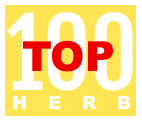 |
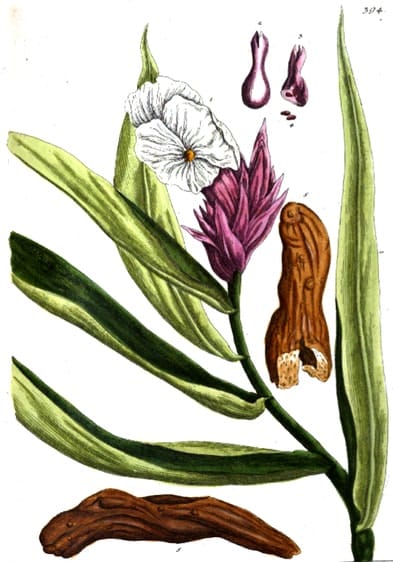
Sweet and Bitter varieties of Costus
Herbarium Blackwellianum, 1757
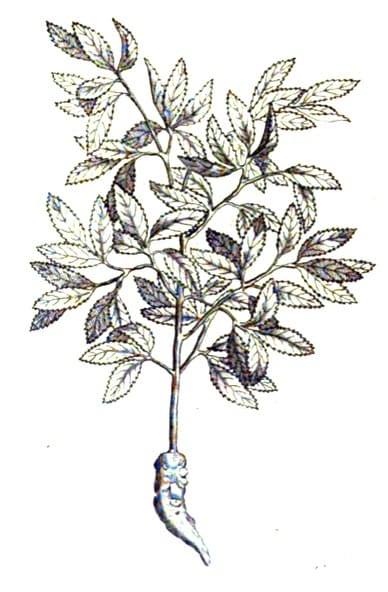 | 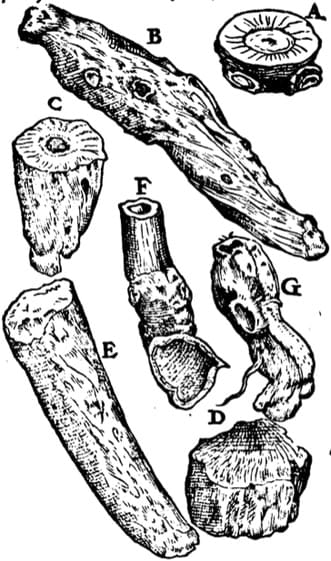 |
|
Arabian Costus A Complete History of Drugs, Pomet, London, 1748 |
Herbarium, showing various Costus types, A. Bitter Costus; B. Sweet Costus; C and D, Another Costus; E. Costus iridem; F. Costus stem /root crown; G. Arabian Costus Matthioli (Polish), 1596 |
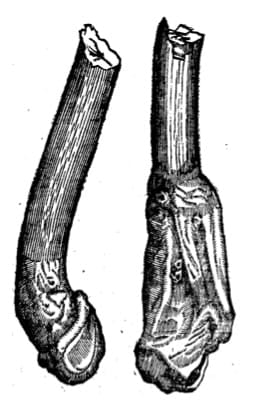 Aromaticum et Simplicium Aliquot, de Orta, 1579 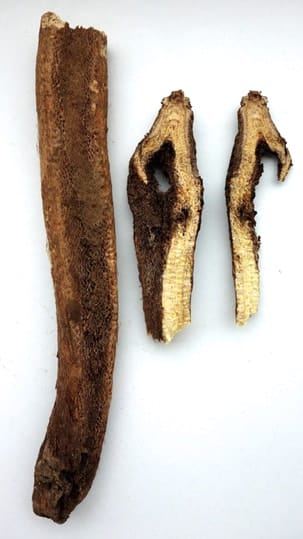 | 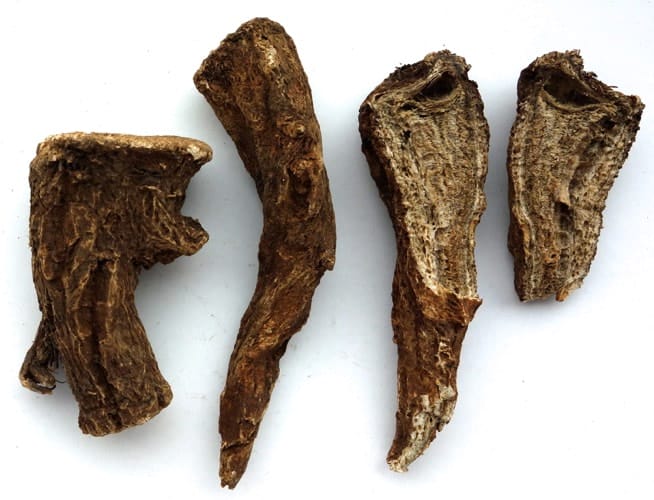 S. lappa from Yunnan (Yun Mu Xiang) (Adam, 2016) 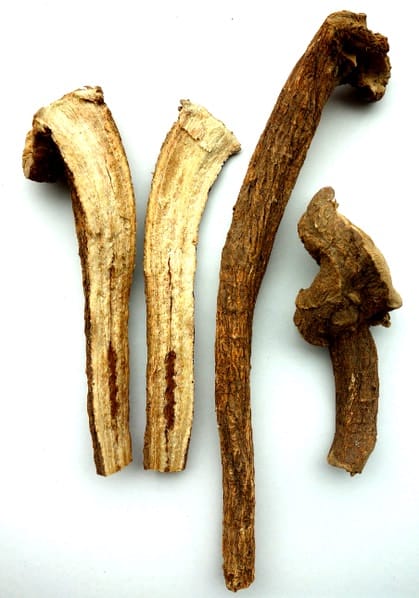 |
|
Vladimiria souliei (Chuan Mu Xiang) (Adam, 2016) |
Costus root used in Tibetan Medicine (Zang Mu Xiang) (Adam, 2016) |

Members CLICK HERE for the PRO VERSION
Botanical name:
Saussurea lappa (syn. Aucklandia lappa)
Parts used:
Root
Temperature & Taste:
Warm, dry. Pungent, Bitter, Aromatic.
opens, attenuates, discusses
Classifications:
2A APERIENT. 2B ATTENUATERS. 2C INCIDER. 2G. CLEANSING. 2H. CARMINATIVE. 2I. ANTISPASMODIC. 2Q. ANODYNE
2S. STRENGTHENING. 2U. SUPPURATIVE
3C. ALEXIPHARMIC. 3D. CORDIALS & CARDIACS. 3E. DIURETIC. 3G. EMMENAGOGUE
4c. CARDIAC. 4e. STOMACHIC. 4g. HEPATIC. 4j. NERVINE. 4k. ARTHRITIC
Uses:
1. Benefits Stomach and Intestines, Moves the Qi: (TCM, Ayurveda, Tibet, West)
-good for the Stomach; poor appetite and digestion
-abdominal distention and epigastric pain (TCM, West, Tibet)
-colic, abdominal pain; Hernia
-Hiccups, Belching, Bloating
-Food Stagnation
-Diarrhea with Spleen deficiency or Cold and Damp
2. Moves Qi, Opens Obstructions: (TCM, Ayurveda, Tibet, West)
-pain over Liver and Gall Bladder; Tumors of the Liver
-Gall stones, Cholecystitis, Jaundice
-Chest, abdominal or Epigastric pain
-‘Costus is useful for all the organs requiring warmth and absorbs humours from deep parts of the body.’. (Avicenna)
3. Clears Wind and Damp: (Ayurveda, Tibet, West, TCM)
-Rheumatism and Wind diseases including Paralysis
-Urticaria, skin eruptions, promotes Complexion (Ayurveda)
-promotes Urine, clears Edema
-‘Relieves pain and Cold in the Urinary Bladder’. (Da Ming)
4. Resists Poison: (Ayurveda, Tibet, West, TCM)
-Malaria, Cholera, Leprosy, Diphtheria
-Scorpion Bites; bites of Viper (Dioscorides, Avicenna)
-used in Antidotes
-‘disperses invasion of pathogenic factors, toxin and evil things’. (Shen Nong Ben Cao)
5. Moves Qi, Clears Phlegm, Stops Cough: (Ayurveda, Tibet, West, TCM)
-spasmodic Cough, bronchial Asthma, chronic Bronchitis (mostly in Ayurveda)
-Pneumonia (Tibet)
-Chest Pain from stagnation of Qi and Cold
-‘disperses stagnant Qi in the Lung’. (Zhang Yuan Su)
-‘purges excess in the Lungs’ (Ben Cao Gang Mu)
6. Regulates Qi, Strengthens Brain and Nerves: (Ayurveda, Tibet, West, TCM)
-Unani texts say it is tonic for Heart, Liver and Brain
-Some sources have regarded it as Tonic and Aphrodisiac in Ayurveda, Tibetan Medicine and TCM
-taken with Honey, it is Aphrodisiac (Dioscorides); Avicenna said taken in wine to vitalize sexual powers.
-Mental disorders associated with Wind or Qi stagnation (Ayurveda); psychosomatic, neurological disorders
-Hemiplegia, Paralysis (Ayurveda, West)
-promotes Intellect, rejuvenates
-said to turn grey hair black in both West and TCM (Porter Smith)
-‘It relaxes the Nerves” (Avicenna)
7. Moves the Qi, Promotes Menstruation
-Amenorrhea; Menstrual Pain
-‘provokes the courses, helps to cleanse the Womb from impurity, and helps Conception’. (Pemell, 1652)
-‘Useful in torn muscles’ (Avicenna)
8. Kills Worms:
-especially Broad-worms (Pemell, 1652)
–Gu syndrome (due to Parasites and Worms) (TCM)
9. Externally:
-oil of Costus is good for Cold and Weak Muscles and Sinews, Sciatica, Arthritis
-compound Oil of Costus; strengthens Nerves, Muscles and Tendons; applied to the Spine in Fevers; also for Colic, Pains; prevents Grey hair
-‘often used to make bathing water by boiling the drug in water.’ (Tao Hong Jing)
-decoction makes a good hair wash to strengthen the hair
-Wounds, Ulcers, Ringworm, chronic Skin Diseases and Tumors (ointment or paste)
-powder is applied to dry moist Sores, Wounds and Ulcers (Avicenna, Pemell)
-headache, mixed with powder with oil and apply to the forehead (Unani)
-powder is applied to Toothache
Dose:
Powder: 1–3 grams
Comment:
… available in PRO version
Corrective:
… available in PRO version
Substitutes:
… available in PRO version
Preparation:
… available in PRO version
Adulterants:
… available in PRO version

Main Combinations:
1. Costus … available in PRO version
2. Organ Pain and obstructions of the Organs, Costus with … available in PRO version
3. Poor appetite and Digestion, Costus with … available in PRO version
4. Indigestion, Abdominal pain, Costus with … available in PRO version
5. Bloating, Rumbling, Diarrhea, Costus with … available in PRO version
6. Sore Throat, Hoarseness, Cough, Chest pain, Costus with … available in PRO version
7. Asthma, Costus with … available in PRO version
8. Bruising, Costus with … available in PRO version
9. Liver obstruction, Liver heat, Hepatitie, Cholecystitis, Costus with … available in PRO version
10. Hysteria, Costus with … available in PRO version
11. Chronic Rheumatism, Costus with … available in PRO version
12. Brain tonic, Costus with … available in PRO version
13. Mental diseases, Costus with … available in PRO version
14. As an oil externally, Costus with … available in PRO version
15. Chronic Joint diseases, combine Costus with … available in PRO version
Major Formulas
Electuary of Costus (Diacostum) (Mesue)
Electuary of Clove and Costus (Caryocostinum)
Antidotum Immortale
Antidote for the Liver and Chronic Cough
Oil of Costus
Costus 6 Powder (Ru rta drug pa) (Tibetan Medicine)
Costus Garuda (Ru khyung) (Tibetan Medicine)
Sea Buckthorn 5 (Star bu 5) (Tibetan Medicine)
Calcite 6 Powder (Tibetan Medicine)
Clove 6 (Li shi drug pa) (Tibetan Medicine)
Amomum 4 (Ko la 4) (Tibetan Medicine)
Cautions:
1. Drying, so not suitable in Yin deficiency
2. Very activating, so not used in Qi deficiency (but can be combined with Qi tonics)
Main Preparations used:
Diacostum, Oil of Costus
